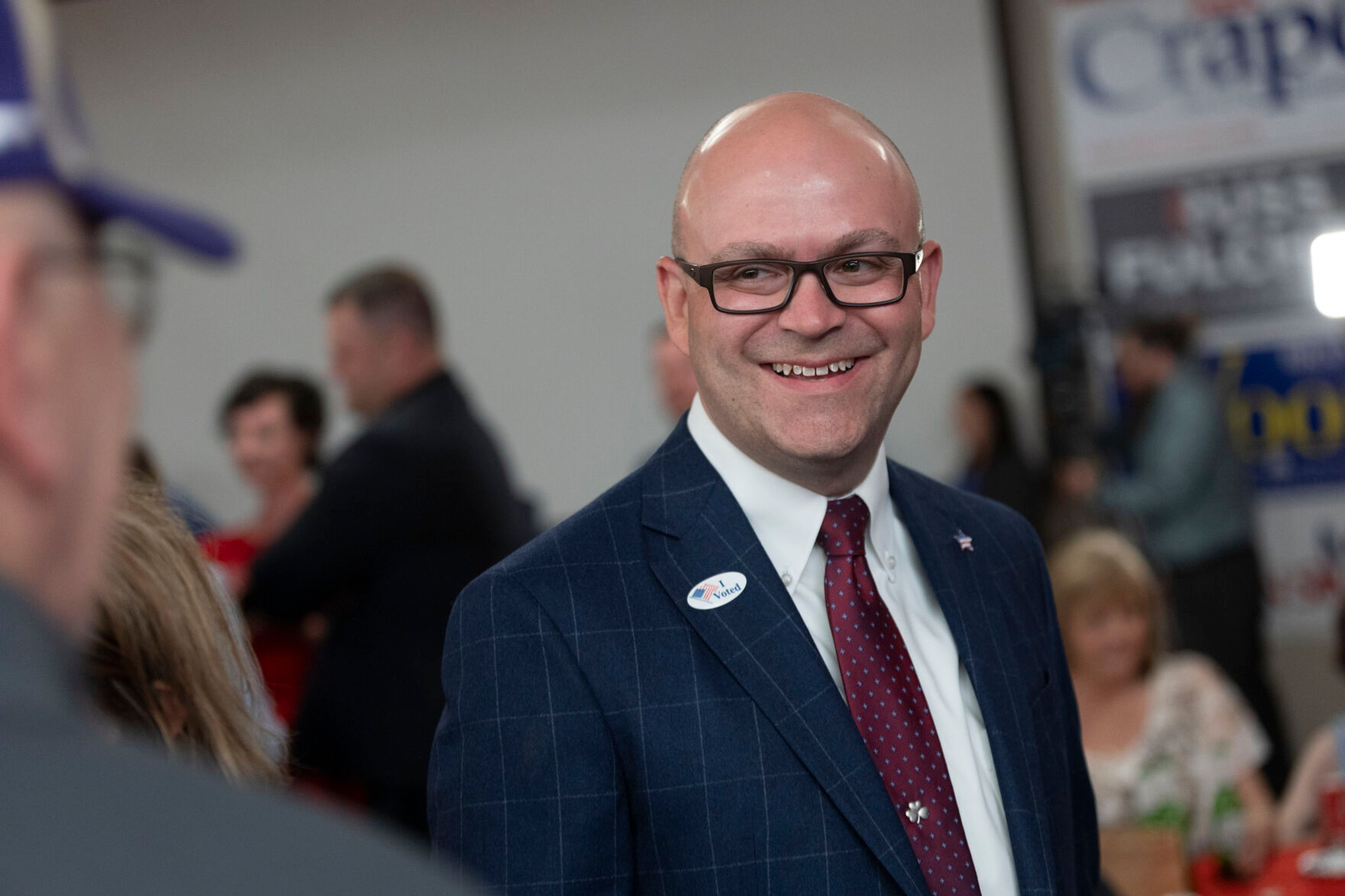New secretary of state lays out ambitious path
Phil McGrane looks for expanded staff, an election system upgrade and a finer guide for voting day
BOISE — Idaho’s recently elected secretary of state, Phil McGrane, is asking the state’s budget writers to expand the office’s budget for new hires, an election system upgrade and a more detailed voter guide.
The office’s total general fund request for fiscal year 2024 is around $7.9 million, significantly up from the previous fiscal year’s appropriation of about $4.5 million. The state’s top election officer is also asking for a $10 million supplemental appropriation for the current fiscal year to upgrade the state’s election system and for three new staff positions.
McGrane made his requests during the office’s budget presentation to the Joint Finance and Appropriations Committee on Monday morning.
“I don’t think it’s any surprise to anyone I am likely to be a much more active and engaged secretary of state than we’ve had in a little bit, and I don’t think secretary (Lawrence) Denney would disagree,” he said at the meeting, referencing his predecessor.
Immediate requests
Because of the nature of elections, McGrane said, some of his requests couldn’t wait until the next fiscal year. His main priority is the $10 million for an election systems upgrade.
“The November 2024 election is happening in November whether we’re ready or not,” he said in an interview.
The office is required by state law to run a centralized voter database that is used by all 44 counties to maintain voter records and administer elections. The system currently being used also manages campaign finance and lobbyist information — consolidating all of these functions in one system has proven to be a challenge, especially with the campaign finance aspect, McGrane said.
“We do have a system that is working, and we had a very successful November election,” McGrane told JFAC, “but while it was a success, that wasn’t without frustrations.”
He gave an example of a glitch in his own campaign finance reporting from his run for Ada County clerk in which a $5 transaction was reported as a $3 billion deficit on his campaign. In an interview, he also talked about the election results reporting for statewide races lagging.
The contract with the vendor of the current system is expiring in August, and McGrane said he cannot seek out requests for proposals from potential new vendors until his office has the funding.
“I know $10 million seems like a lot,” he told the budget committee. “... it really is a pressing issue that we need to address.”
His supplemental requests include three new staff positions in his office, which have a total annual cost of $292,700, according to the Legislative Budget Book. One is for a position that is currently vacant but not funded for an executive assistant. McGrane said all the other constitutional officers have this position and that the job of managing his schedule and meetings has fallen on others among his staff.
“I would say everyone in the office is feeling that,” he said.
Another priority of his is hiring an election education coordinator to develop and implement a training curriculum for all county clerks and local election officials.
“I hear about it all the time,” he said, “just the need for standardization and the need for training for county clerks and election officials throughout the state.”
Another new position comes from his experience as Ada County clerk, he said. He wants to hire a data scientist to use elections-related data analytics to produce real-time visuals and mapping; this is a position held at the Ada County elections office, he said, and it’s yielded interesting and useful results. The employee would also organize the reporting of statewide election results, auditing election records, and developing transparency tools for campaign finance and lobbyist information, according to the budget book.
“Sharing data and information has been crucial,” McGrane said, “and the data scientist ties into the development of what our needs are for the election management system.”
McGrane highlighted in his presentation that the office’s revenues have also been increasing, much of which he attributed to a growth in business filings.
“Even if you fully funded all of the ongoing requests for the secretary of state’s office in this budget, the general fund would still see an additional almost $2.7 million, and we are being conservative in our estimates,” he told the committee.
Near future of the office
One of McGrane’s top priorities that he’s touted since the beginning of his campaign was instituting a detailed voter guide with candidate information.
Last week, he proposed legislation requiring his office to create and distribute a comprehensive voter guide for primary and general elections in the state. It would include information about federal and statewide candidates, personalized to the voters’ districts, as well as information about voter registration and requirements, important dates, and county clerk contact information.
This is expected to cost $750,000 in ongoing general funds to design, produce and distribute, according to the fiscal note. In odd years, it would be $300,000 budgeted for the voter pamphlet.
Currently, the state sends out a voter pamphlet that only contains information about proposed constitutional amendments, initiatives and referendums, and advisory vote questions.
McGrane said that the most common question he’s heard, both in his current position and as a county election official, is “where is my voter guide?” Most of the surrounding states, which McGrane referred to as Idaho’s “feeder states,” provide this type of guide, and voters have come to expect it.
If the legislation is passed and the state allocates funds, the guide would include candidate information including a statement of up to 200 words, contact information and a current photograph. It could also include “any additional information relating to elections as is required by law or in the discretion of the secretary of state is deemed informative to electors,” the bill states.
McGrane said he wants to start with federal and statewide candidates, but eventually include local candidates as well.
“The further down the ballot you get, the more complicated it gets,” he said.
In fiscal year 2024, McGrane would also like to see the addition of three new full-time positions. He said he looked at other secretary of state offices across the country and noticed Idaho’s is one of the smallest.
He hopes to add a voting system specialist, campaign finance specialist and lobbyist specialist. This would cost a total of around $233,000.
Idaho code requires the office to certify all voting systems used by counties to ensure their accuracy and security, according to the budget book request, but this function doesn’t currently exist.
The campaign finance and lobbying specialists would help people navigate the systems for reporting as well as understand the requirements. This would also help on the enforcement side, he said.
“I think many people don’t realize how technical the legal requirements are,” McGrane said.
Rep. Josh Tanner, R-Eagle, asked McGrane during the budget hearing if any of the positions could be part-time.
McGrane responded that elections are either being run or prepared for all the time throughout the state. He said that campaign spending has also increased dramatically. In 2021, which was an off election year, nearly $12 million in campaign funds were flowing through the state.
His request also included two part-time requests for help with his duties on the Land Board and for receptionist coverage in the office during the lunch hour.
This session, McGrane is supporting legislation that would move the state’s presidential primary back to May, which could save the state an estimated $2.5 million. HB 128 was sponsored by Rep. Dustin Manwaring, R-Pocatello, and introduced Monday.
McGrane is also supporting a bill to improve clarity and uniformity in voter registration requirements as well as implement a free identification card for qualifying individuals to use for voting and registering to vote. Rep. Brandon Mitchell, R-Moscow, sponsored HB 126, which lists acceptable ways those registering to vote may prove identity and residency. It also would direct the Idaho Transportation Department to issue a four-year, no-fee ID card to adults 18 or older who haven’t had a current driver’s license within six months and who need ID to register to vote.
Long-term vision
On the business side, McGrane said, he hopes to partner with organizations such as the Small Business Administration or Tax Commission to streamline the process for business filings for entrepreneurs.
However, much of McGrane’s vision for the office involves outreach to the community about elections.
“The secretary’s in a great position to share voting information,” he said.
His office has started working with county clerk offices about sharing voter communication tools to better share when elections are coming up and how to vote. He also envisions more education, especially partnering with K-12 schools.
Using the new data scientist position, he’d like to expand voting data visualization — both for practical uses and fun uses, such as being able to look up the most common names of people who voted in certain elections.
“I think we can do a lot just to raise more awareness about voting and elections,” he said.
Guido covers Idaho politics for the Lewiston Tribune, Moscow-Pullman Daily News and Idaho Press of Nampa. She may be contacted at lguido@idahopress.com and can be found on Twitter @EyeOnBoiseGuido.









